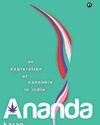Moments shared between mother and daughter with an old photo album opens up a well of emotions.

“WHEN WAS THIS, MA?” There is no response. It’s not because she’s trying to remember. It’s the guilt of not being able to remember. I know that face.
I turn the page. It’s not the page of a book— those are light and easy to turn, easy enough for even a breeze to move. These pages are heavy, thicker than chart paper. They are the pages of my parents’ old photo album. Unlike the pages of a book, they are black in colour—greyish black, as if all the light has been eaten by the photos, leaving them bereft of light. The pages, therefore, are not light. I know I’m repeating myself. That might be because I’ve already begun metaphorizing them. I have started seeing in them the weight of time, their resistance to being moved.
On the next page is a photo of my mother with her friends. Two of them— Kumkum mashi [aunt in Bengali]; the name of the second I can’t remember. “Is this Annapurna mashi?” I ask Ma.
Ma takes the album from my hands and brings it close to her face, as if this proximity created by space would help her reach closer to where she wants to be in time. “I wonder where Annapurna is now,” she says.
She can’t say the same about Kumkum mashi. We know where she is now.
Beyond our reach, beyond the reach of a camera, where most things in life are now kept trapped, for fear of them being taken away from us. In the brackets that hold the span of our mortal lives when we consign them to the strange code we’ve invented to denote our time on earth, Kumkum mashi’s had been closed, some time in the 1980s, when I was in school.
Diese Geschichte stammt aus der September 2018-Ausgabe von Reader's Digest India.
Starten Sie Ihre 7-tägige kostenlose Testversion von Magzter GOLD, um auf Tausende kuratierte Premium-Storys sowie über 8.000 Zeitschriften und Zeitungen zuzugreifen.
Bereits Abonnent ? Anmelden
Diese Geschichte stammt aus der September 2018-Ausgabe von Reader's Digest India.
Starten Sie Ihre 7-tägige kostenlose Testversion von Magzter GOLD, um auf Tausende kuratierte Premium-Storys sowie über 8.000 Zeitschriften und Zeitungen zuzugreifen.
Bereits Abonnent? Anmelden

ME & MY SHELF
Siddharth Kapila is a lawyer turned writer whose writing has focussed on issues surrounding Hinduism. His debut book, Tripping Down the Ganga: A Son's Exploration of Faith (Speaking Tiger) traces his seven-year-long journey along India's holiest river and his explorations into the nature of faith among believers and skeptics alike.

EMBEDDED FROM NPR
For all its flaws and shortcomings, some of which have come under the spotlight in recent years, NPR makes some of the best hardcore journalistic podcasts ever.

ANURAG MINUS VERMA PODCAST
Interview podcasts live and die not just on the strengths of the interviewer but also the range of participating guests.

WE'RE NOT KIDDING WITH MEHDI & FRIENDS
Since his exit from MSNBC, star anchor and journalist Mehdi Hasan has gone on to found Zeteo, an all-new media startup focussing on both news and analysis.

Ananda: An Exploration of Cannabis in India by Karan Madhok (Aleph)
Karan Madhok's Ananda is a lively, three-dimensional exploration of India's past and present relationship with cannabis.

I'll Have it Here: Poems by Jeet Thayil, (Fourth Estate)
For over three decades now, Jeet Thayil has been one of India's pre-eminent Englishlanguage poets.

Orbital by Samantha Harvey (Penguin Random House India)
Samantha Harvey became the latest winner of the Booker Prize last month for Orbital, a short, sharp shock of a novel about a group of astronauts aboard the International Space Station for a long-term mission.

She Defied All the Odds
When doctors told the McCoombes that spina bifida would severely limit their daughter's life, they refused to listen. So did the little girl

DO YOU DARE?
Two Danish businesswomen want us to start eating insects. It's good for the environment, but can consumers get over the yuck factor?

Searching for Santa Claus
Santa lives at the North Pole, right? Don't say that to the people of Rovaniemi in northern Finland